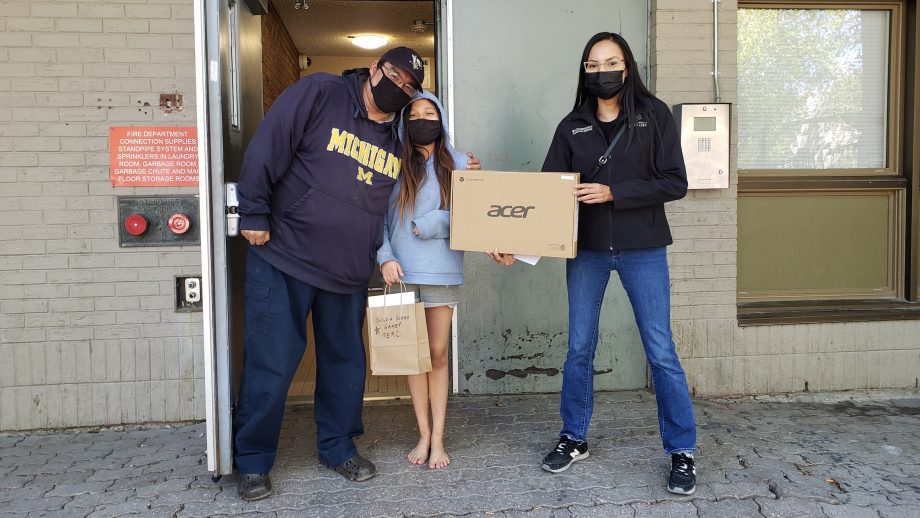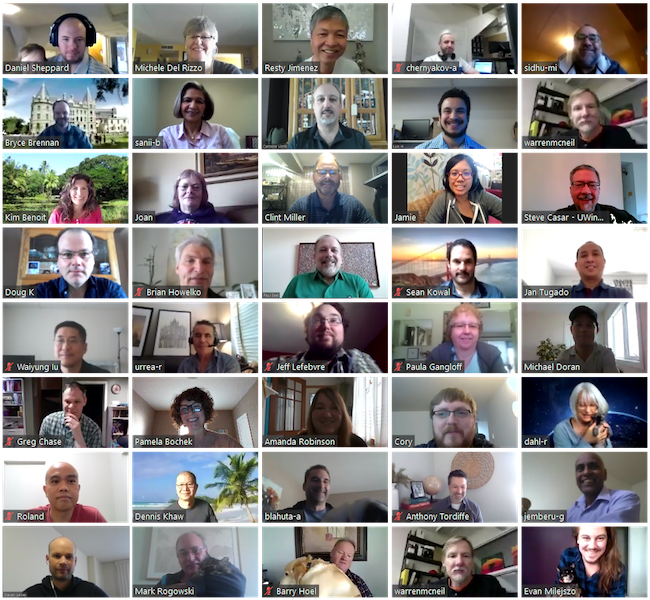A trio of University of Winnipeg business and administration students took home the $5,000 first-place prize in the Virtual Hackathon. Over the course of an intense weekend in November, Francine Camia, Justin Baldwin, and Mack Borys developed and pitched an academic software platform to improve online and remote learning.
“We met in class and soon realized we shared an entrepreneurial spirit,” said Borys. “Francine brought the idea of (participating in) the Hackathon to Justin and myself, and we all thought it would be a great way to share our passion for improving remote learning while gaining invaluable knowledge from the several mentors involved.”
The competition was organized by four of Manitoba’s post-secondary institutions in co-operation with North Forge Technology Exchange. It featured teams of post-secondary students pitching their ideas to enhance student engagement while maintaining academic integrity in a virtual setting.
We want to replicate an in-person experience by providing a structured learning platform that aids professors in instructing, while making the online learning experience easier for students.
Justin Baldwin
“Hackathons are where your ideas can become a reality, where a group of innovative talent tackles a problem. In this case, the Hackathon focused on the academic integrity of remote learning. We are all facing unique challenges during this pandemic; it made sense to tap into Manitoba’s post-secondaries to hear from the students who are experiencing this firsthand and hear their solutions,” said North Forge CEO Joelle Foster. “We were blown away by the innovative solutions that were pitched and are excited to have the winning team join North Forge programming in hopes of taking their idea to commercialization.”
Because they knew the problems associated with remote learning firsthand, the group felt confident heading into the Hackathon.
“We also consulted a lot of our friends prior to the Hackathon to see what aspects of remote learning they would like to see improved,” Camia noted.
A hackathon is a form of rapid prototyping, organized to develop technology solutions in a safe environment and within an expedited time frame. Participants were asked they could improve the remote learning experience and given just under 48 hours to come up with a technology solution, develop a working prototype, and pitch their idea before a panel of judges.
The winning pitch
The idea Camia, Borys, and Baldwin pitched was a platform called WeLearn, a one-stop shop that clearly identifies your role as a student and prioritizes the importance of engagement as a social being. This software is an online portal designed for both students and faculty.
During their pitch, Baldwin highlighted issues the team has had with remote learning: lack of participation, engagement, and attendance, and lack of social interaction.
“Our goal is to help students engage by monitoring and tracking student activity to increase participation and to provide an in-person experience to remote learning,” Baldwin explained. “We want to replicate an in-person experience by providing a structured learning platform that aids professors in instructing, while making the online learning experience easier for students. We also wanted to provide a social network that incentivizes them to engage with each other.”
To help improve this aspect, WeLearn would give students and professors many functions that other software currently does not have. The platform would allow students to go to class, engage with each other, and access programs such as tutor halls, office hours, student services, and much more.
It would be completely customized to help students who struggle with stress and anxiety around virtual learning. A few of the many proposed features to increase engagement and decrease anxiety include: students showing their camera to only the professor, privately answering or asking questions, and participating in anonymous polls.
“As a judge for the Hackathon, I was impressed by the calibre of the eight teams that competed,” said Rosalie Harms, Chair of the Department of Business and Administration. “What differentiated the winning team from its competitors was the team’s ability to clearly articulate the problem statement and put forward a creative solution with the potential for tangible outcomes.”
There are also improved features for faculty, who would be able to check who’s in their class and their participation score, form groups virtually, and talk to those groups individually without interrupting the rest of the class.
“Academic integrity is a huge concern in online learning and our plan is to completely secure this with further expansion,” Baldwin explained.
The goal of WeLearn is to be the go-to platform for academic learning and social interaction for university students. It would eliminate the need for any other software by providing an integrated platform for things ranging from email and course information to career planning.
What’s next?
Since the Hackathon, the trio has met with UWinnipeg’s Dean of Business and Economics and the Chair of the Department of Business and Administration. They are also planning to meet with representatives of other post-secondary institutions.
“We think this program has potential, so we want to see how far we can take it while addressing the concerns and requests from other universities.” Baldwin said. “North Forge has shown interest and will be working with us on executing this start-up.”





